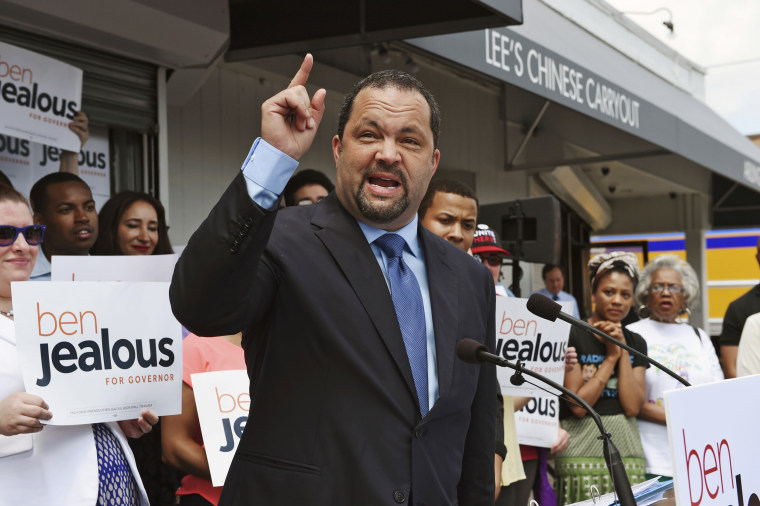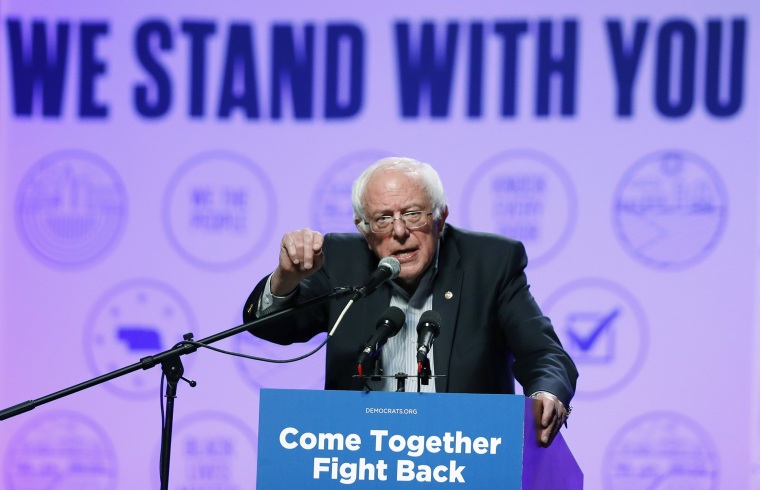WASHINGTON — Ben Jealous wants to do what Bernie Sanders' couldn't: Win.
The former NAACP president's work as one of Sanders' most prominent surrogates last year led to his own campaign for governor of Maryland, which he launched last week.
“The campaign that I will build will focus equally on not just defending but extending Obama's legacy, and finishing what Bernie started,” Jealous, who hopes to combine the support of young progressives and people of color into a winning coalition, said in an interview with NBC News. “Politics cannot be symbolic. We are in this to win real victories for real people in real time to make real change."
Sanders’ “political revolution” has helped move the center of gravity in the Democratic Party to the left, pushing issues like single-payer health care and debt-free college closer to the mainstream. But it’s had a harder time actually winning elections.
Maryland is one of four heavily Democratic states with GOP governors. Ambitious Dems are lining up to challenge Republican Gov. Larry Hogan in 2018, when he's expected to be vulnerable thanks to President Donald Trump’s deep unpopularity in a state where Democrats outnumber Republicans two-to-one.
Jealous, well known as the youngest person ever to lead the NAACP, is one of the first candidates to get in the race. But several top-tier hopefuls are expected to follow, setting up what will likely be one of the nation’s marquee Democratic primaries next year, helping to set the party’s ideological course ahead of the 2020 presidential election.
The primary, like almost every one that gets tagged as a replay of the Hillary Clinton-Sanders face off in 2016, is more complicated, with race, experience, and geography all likely to be major factors.
So far, Sanders and his allies have suffered more high-profile losses than wins.
Another setback may come on Tuesday in New Jersey. Polls in the state’s gubernatorial primary show Phil Murphy, a former Goldman Sachs executive with near-unanimous support from state party leaders, on track to beat a Democratic field that includes state Sen. John Wisniewski, who chaired Sanders' presidential campaign in the state.
"There's a new openness to serious, honest compassionate populism"
Sanders himself has stayed out the race, a snub familiar to several Sanders-aligned candidates who waited in vain for a visit from the Vermont senator.
Other recent losses include: Rob Quist, the congressional candidate in Montana, where Sanders made four stops the weekend before the election; Heath Mello, whose Omaha mayoral campaign Sanders helped nationalize; Rep. Keith Ellison, whose bid to lead the Democratic National Committee ended with a consolation prize of deputy chair; and Sanders-wing candidates who lost bids to lead state Democratic parties in California, Florida and Maine.
Neither of the two Sanders-aligned candidates in an April special congressional election in Los Angeles made it to the runoff. “We’re really good on the messaging, and the rallies,” Wendy Carrillo, one those candidates, told Politico California. “But it needs to translate into votes.”
But Sanders' defenders say the so-called party establishment loses plenty of races, too, starting with Clinton.
They point to a slew of down-ballot wins, tallied on the website of Our Revolution, which grew out of Sanders’ presidential campaign, and some higher-profile ones like Rep. Primaya Jayapal's successful race last year.
And they say party leaders are too quick to pass over races in tough districts, like the one Christine Pellegrino won last month to claim a New York Assembly seat from a part of Long Island Trump carried overwhelmingly.
“The teachers union and the Working Families Party forced the Democratic Party to back a bold progressive in a race that they had written off,” said Bill Lipton, the New York State Director of the liberal Working Families Party.
“It just shows that that message, regardless of the person that it's attached to, that's the message that people want to hear," said Pellegrino, who was a Sanders delegate to the Democratic National Convention.
And in almost every race, defenders say, even losing Sanders-wing candidates help shape the eventual winner’s policies.
“I think this year you are seeing an outpouring of a new politics — and whether someone voted for Bernie or Hillary, there's a new openness to serious, honest compassionate populism,” said Zephyr Teachout, a prominent progressive activist who ran unsuccessfully for Congress last year.
But a state assembly race is still a baby step compared to winning contests for governor, Senate or even president.

In Maryland, Jealous says Sanders voters are crucial to his path to victory.
“You start with the broad coalition that comes out of a so-called unsuccessful presidential primary bid and then you add to it the life that you’ve lived,” said Jealous, whose interracial parents were not legally allowed to marry in Maryland in 1967.
Specially, that means African-Americans, who make up about 45 percent of the Democratic primary electorate in Maryland, but with whom Sanders struggled to win support.
Jealous’ model is Doug Wilder, who became the first African-American governor since Reconstruction when he won in Virginia in 1989, in part by building on Jesse Jackson’s presidential campaign from the previous year.
Sanders has been criticized for saying the Democratic Party needs to focus more on economic issues and less on so-called identity politics.
But Jealous, perhaps surprisingly for the former head of the NAACP, says a class-based appeal is necessary to win both working-class whites in western Maryland and African-Americans in Baltimore.
“Our party is the party of FDR, JFK, MLK, RFK and LBJ,” he said. “When you're that party, of course you have to stand up for civil rights. But if we're honest, each of those folks were as committed, if not more so, to ending poverty and expanding opportunity. Dr. King died planing the Poor Peoples' campaign. FDR's greatest legacy is what he did to lift us out of the Great Depression," he said.
"We as a party have to get back to being all of who we are,” he added.
CORRECTION (June 5, 2017 1:41 p.m.): An earlier version of this article misstated the first name of the New York state director of the liberal Working Families Party. He is Bill Lipton, not Dan Lipton.

